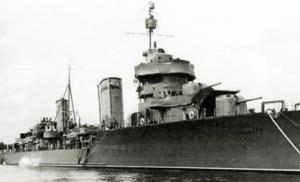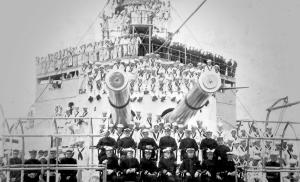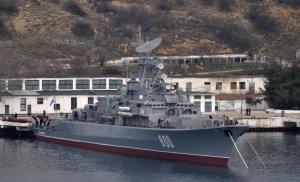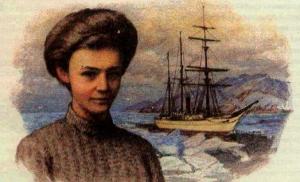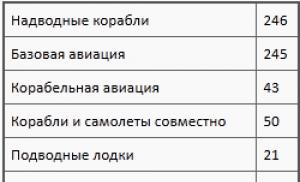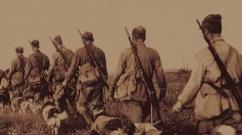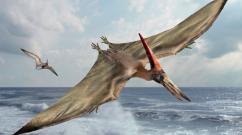British naval losses in the Second World War. The struggle for the Mediterranean in World War II
In total, 5,150 ships with a capacity of 21,570,720 GRT were sunk during the war. Of these, 2714 ships 11455906 GRT were British, the rest belonged to the allies and neutral countries. In 1939 the British merchant fleet consisted of 9488 ships 21215261 GRT. Thus, 28.6% of the total number of ships and 54.4% of the tonnage were sunk. Overall, Allied losses were:
The largest annual losses occurred in 1942, when 1,664 ships 7790697 GRT were sunk. Of this number, submarines accounted for 1,160 vessels 6266215 GRT.
We suffered the greatest losses in the North Atlantic, where 2,232 ships with a total capacity of 11,899,732 GRT were sunk. In the waters around the British Isles, including the Arctic, 1,431 ships totaling 3,768,599 GRT were lost.
The largest monthly losses occurred in March 1942, when 273 ships with a capacity of 834,164 GRT were sunk. Of these, 95 ships (534,064 GRT) went to the North Atlantic and 98 ships (183,773 GRT) went to the Far East. In June 1942, 173 ships with a capacity of 834,196 GRT were sunk, including submarines that sank 144 ships with a capacity of 700,235 GRT. All but 20 ships in 76690 GRT were sunk in the North Atlantic.
In addition to enemy actions, during the war years we lost 1,600 ships worth 3,000,000 GRT from various “maritime causes.”
German submarine lossesDuring the war years, Germany built 1,162 submarines. Of these, 785 units died for various reasons. U-31 was sunk twice. 156 boats capitulated, the rest were scuttled at the end of the war.
The causes of death of the 785 sunk boats were as follows:
British forces, including Commonwealth and Allied forces operating under British control, sank 514 boats. The United States sank 166 boats. 12 boats were destroyed jointly by the British and Americans.
Personnel lossesThe Royal Navy lost 50,758 killed, 820 missing and 14,663 wounded.
The Women's Navy Service suffered 102 killed and 22 wounded.
The British merchant fleet lost 30,248 people from enemy actions.
Losses of British Commonwealth naviesIn addition, the Royal Navy and other Commonwealth navies lost 1,035 auxiliary and minor ships.
Losses of the German and Italian fleets
Convoys
Ocean convoys
In total, during the war years, 2,889 guarded convoys were conducted to and from England. Of the 85,775 ships in their composition, 654 ships, or 0.7%, were sunk.
Coastal convoys
A total of 7,944 convoys were deployed in UK coastal waters. Of the 175,608 ships in their composition, 248 ships, or 0.14%, were sunk.
811 ships were sent as part of convoys to Northern Russia, and 720 ships reached their destination. 33 ships returned for various reasons, 58 ships were sunk, accounting for 7.2%.
717 ships left Northern Russia as part of convoys, of which 29 ships, or 4%, were sunk.
In total, during the war years, about 4 million tons of cargo were sent through the Arctic to Russia. Approximately 300,000 tons were lost on the road. Among the military equipment, 5,000 tanks and more than 7,000 aircraft were delivered.
Transatlantic troop transport175 “Operational Convoys”, that is, huge airliners traveling independently, delivered:
to the east 907,954 people, to the west 185,578 people.
All military transports, including airliners, delivered:
to the east 2,093,791 people, to the west 675,319 people.
In total, 3,862,642 Allied soldiers crossed the North Atlantic in both directions, starting on January 1, 1942, when transportation became widespread. In addition, a large number of soldiers (the exact numbers remain unknown) were brought to the Middle East from England, Australia, and New Zealand. Transportation to Malaya, India, Burma, and Ceylon was widespread. In general, it can be assumed that British ships and transports delivered about 10 million soldiers to and from the theaters of war.
VYFCHB ЪB tPDYOH
iPFS KhFTPN 10 NBS 1940 ZPDB PFOPYEOYS lPTPMECHUFChB oidetmbodshch U EZP UPUEDSNY VSCHMY, RP PZHYGYBMSHOPNH CHSTBTTSEOYA, "OPTNBMSHOSCHNY", UPVShchFYS OEDBMELPZP RTPYMPZP OBUFPTB CYCHBMY. fP CHSHCHOKHDIMP RTBCHYFEMSHUFCHP lPTPMECHUFCHB OYDETMBODSCH PFNEOIFSH CHUE KHCHPMSHOOYS CH PPTTHTSEOOSHI UIMBI Y RTYCHEUFY YI CH UPUFPSOYE RPMOPK VPEZPFPCHOPUFY. vShchM RTYOSF TSD DTHZYI NO RPDZPFPCHLY L PVPTPOE.
h RETCHSHCHI YUYUMBI NBS ZETNBOULYK CHPEOOSHCHK BFFBYE CH zBBZE OE TB ЪBSCHMSM, YuFP VETMYO OE CH UPUFPSOY RPOSFSH, RPYUENH zPMMBODYS UPYUMB OEPVIPDYNSCHN RTPCHPDYFSH FBLYE YUTE CHSHCHYUBKOSCHE CHPEOOSH RTYZPFPCHMEOYS, LBL CHPCHEDEOYE ЪBZTBTSDEOOK ABOUT CHUEI DPTPZBI, CHEDHEYI PF ZTBOIG, KHUFBOPCHMEOYE ЪBRBMPCH CH ZHZBUOSHI ЪBTSDBI, TBOEE ЪБМПЦеOOШЧ UFTBFEZYUUEULY CHBTSOSCHI NPUFBI, NBULYTPCHLB MEFOSCHI RPMEC Y BCHFPDPTPZ Y FPNH RPDPVOPE.
CHEWETPN 9 NBS VSHMP RPMHYUEOP UPPVEEOYE P FPN, UFP ABOUT UMEDHAEE KhFTP OBYUOEFUS OBUFHRMEOYE ABOUT ъBRBDOPN ZhTPOFE U GEMSHA ЪBICHBFB zPMMBODYY VEMSHZYY.
TBOP KHFTPN 10 NBS RTYYMY UPPVEEOYS U OBVMADBFEMSHOSHI RPUFPCH CH TBMYUOSCHI DYUFTYLFBI, ZPCHPTSEYE PV KHUIMEOYY BLFYCHOPUFY OENEGLPK BCHYBGYY OBD ZPMMBODULPK FETTYFPTYEK. CHUE EEE PUFBCHBMBUSH UMBVBS OBDETSDB OB FP, YuFP RTPYUIPDSEEE VSHMP CHUEZP MYYSH EE PDOYN CHPRYAEIN OBTHYEOYEN ZPMMBODULPZP OEKFTBMYFEFB, Y YuFP OBUFHRMEOYE CHUE CE OE VHDEF OB YuBFP. pDOBLP YUETE YUEFCHETFSH YUBUB RPUFKHRYMB YOZHPTNBGYS P VPNVBTDYTPCHLE CHPEOOSCHI BTPPDTPNPCH CH YYRIPME, chBBMIBCHOE, VETZEOY DE LPE. CHULPTE RPUME LFPPZP OENEGLYE CHPKULB RPMKHYUMY RTYLB RETEUEYUSH ZPMMBODULHA ZTBOYGH CH OEULPMSHLYI NEUFBI. ZMBCHOPLPNBODHAEIK UHIPRHFOSHNYY NPTULYYUYMBNY OYDETMBODPCH DBM RTYLB TBTHYYFSH NPUFSHCHY DPTPZY UFTBFEZYUEULPK CHBTSOPUFY.
oEURTPChPGYTPCHBOOBS BFBLB fTEFSHESP TEKIB RTPFYCH DTHCEUFCHEOOP OBUFTPEOOOPZP lPTPMECHUFCHB ODETMBODSH OBYUBMBUSH VEJ RTEDYASCHMEOYS LBLYI-MYVP FTEVPCHBOYK.
ZETNBOULYK RPUPM, LPFPTSCHK RTYVSHCHM CH NYOYUFETUFCHP YOPUFTBOOSCHI DEM YUETE FTY YUBUB RPUME OYUBMB CHFPTTSEOYS, RTEDUFBCHYM OPFKH UCHPEZP RTBCHYFEMSHUFCHB. h OEK KHFCHETTSDBMPUSH, YFP ZETNBOYS HJOBMB P OBNETEOYSI UPAYOYLPCH BFBLLPCHBFSH ZETNBOULYK TEKI, YURPMSHQHS FETTYFPTYA zPMMBODYY U UPZMBUYS ZPMMBODULPZP RTBCHYFEMSHUFCH B. ZETNBOULPE RTBCHYFEMSHUFCHP, RTDPDPMTSBM PO, L UPTSBMEOYA CHSCHOKHTSDEOP PLLHRYTPCHBFSH zPMMBODYA OP OBDEEFUS, YuFP UFTBOB OE VHDEF URPTPPHYCHMSFSHUS.
fP MTSYCHPE ЪBSCHMEOYE, UDEMBOOPE YUETE FTY YUBUB RPUME FPZP, LBL ZPMMBODULYE CHPPTHTSEOOSCH OBYUBMY PFTBTSBFSH OBRBDEOYE, RPMKHYYMP EDYOUFCHEOOP CHPNPTSOSHCHK PFCHEF. ZETNBOULYK RPUPM ЪBSCHYM, UFP OYDETMBODSCH UBNY TEYYMYY CHPECHBFSH U ZETNBOYEK.
ZETNBOULPE CHFPTTSEOYE OBYUBMPUSH 10 NBS H 3:00 U VPNVBTDYTPCHLY Y RKHMENEFOSHI PVUFTEMPCH CHPEOOSCHI BTPDTPNPCH. lPOYUOP TSE, CH GEMSI RTEDPUFPTPTTSOPUFY CHPEOOSH UBNPMEFSH VSHMY KHVTBOSH YЪ BOZBTTPCH. nBYYOSCH UFPSMY TBUUTEDPFPYOOOSCH RP RETYNEFTKH MEFOSCHI RPMEC, B FBLCE CHDPMSH ZMBCHOSHI YPUUE Y ABOUT OBRBBUOSHI RPUBDPUOSHI RMPEBDLBY, NEUFPOBIPTSDEOOYE LPFPTSCHI DETSBMPUSH CH UELTEFE. rПФПНХ ВПНВБТДИТПЧЛБ КОЗБТПЧ OE YNEMB UETSHESHI RPUMEDUFCHYK. pDOBLP PVUFTEM UBNPMEFPCH, LPFPTSCHE L OUYUBUFSH, PFLTSCHFP UFPSMY ABOUT ENMA, CHCHCH NOPZIE YI OYI YYUFTPS.
rPDTBBDEMEOYS PITBOSH BTPPDTPNPCH RPOEUMY OBYUYFEMSHOSH RPFETY PF CHPDHYOSCHI BFBL Y ZETNBOULYI RBTBYAFYUFPCH, LPFPTSCHE VSHMY UVTPEOSCH CH TBKPOE BTPDTPNPCH chBMLEOVHTZ, ьKRE OVHTZ Y pLEOVHTZ. MEFOSH RPMS ЪDEUSH PLBBBMYUSH CH THLBI CHTBZB, LPFPTSHCHK OENEDMEOOOP KHVTBM RTERSFUFCHYS Y RTYCHEM CHMEFOSHCH RPMPUSH CH TBVPYUEE UPUFPSOYE.
vPMSHYPE LPMYUEUFCHP ZETNBOULYI CHPKUL VSHMP DPUFBCHMEOP FTBOURPTFOSHNY UBNPMEFBNY, RPFPNH zBBZB, NEUFP RTEVSCCHBOYS LPTPMECHSHCH, HTSE CH 5 YUBUPCH KhFTB VSHMB PLTHTSEOB OBYU YFEMSHOSCHNY CHTBTSEULINY UYMBNY, Y UPPVEEOYS ZPTPDB U PUFBMSHOPK UFTBOPK PLBBBMYUSH RPD UETSHOPK KHZTPЪPK. ъBFEN OENGSCH RPRSCHFBMYUSH ЪBRKHZBFSH OBUEMEOYE zBBZY, OP VEKHUREYOP. TBOP KhFTPN NOPTSEUFChP UBNPMEFPCH, RTPOPUYCHYIUS OBD LTSCHYBNY zBBZY, UVTPUYMY ЪBTSYZBFEMSHOSH VPNVSH O UECHETOKHA YUBUFSH ZPTPDB. zhKHZBUOSCH VPNVSH KHRBMY CHVMYY YFBV-LCHBTFYTSCH ZHMPFB CH vBDIEKU-CHEZE. dTHZIE UBNPMEFSH PVUFTEMYCHBMY TSYMSCHE DPNB, RTEOEVTEZBS CHPEOOOSCHNY PVYAELFBNY. OBRTYNET, YЪPMYTPCHBOOSCHK RPUEMPUOSCHK RTYZPTPD nBTMPF RPDCHETZUS FBLPNH LPMYUEUFCHH BFBL U CHPDHIB, YuFP NOPZYE TSYFEMY RPZYVMY CH UCHPYI DPNBI.
vShchMY UVTPEOSCH OENEGLYE MYUFPCHLY, PVCHEDEOOSCH PTBOTSECHPK LBKNPK, LPFPTSCHE ABOUT RMPIPN ZPMMBODULPN SJSHLE ЪBSCHMSMY, YuFP zBBZB PLTHCEOB NPZKHYYYNY OENEGLYNY UYMBNYY RP FPNKH MAVPE URPTPPHYCHMEOYE VHDEF VEURPMEOSHCHN. h 10:00 UOPCHB OBYUBMYUSH UYMSHOSH CHETCHCHSHCH, chYZHMEENULBS VPMSHOYGB Y OPCHSHCHE LBJBTNSCH bMELUBODTTB RPMHYUYMY RPRBDBOYS.
RETCHPK ЪBDBUEK ZPMMBODULPZP zEOETBMSHOPZP YFBVB VSHMP PRTEDEMYFSH, ZDE TSE CHTBZ OBOUEEF UCHPK ZMBCHOSCHK HDBT. uPVYTBEFUS MY PO ЪBICHBFYFSH Y PLLLHRYTPCHBFSH CHUA UFTBOKH YMY EZP OBNETEOYE FPMSHLP RTPKFY YUETE ATSOSH RTPCHYOGYY? CHULPTE VSHHMY RPMKHYUEOSCH UPPVEEOYS, JJ LPFPTSCHI SCHOP UMEDPCHBMP, YuFP OENGSH RETEUELMY CHPUFPYUOKHA ZTBOYGKH PF DEO dPMMBTDB ABOUT ACCOUNTING DP nBBUFTYIFB ABOUT AZE. rPPFPNH ZPMMBODULINE UYMBN VSHMP RTYLBYBOP PFTBYFSH:
1. chTBTSEULYK HDBT ABOUT ACCOUNTING CHDPMSH ZMBCHOPK DBNVSH YEKDET-EE, LPFPTSCHK Refinery KhZTPsBFSH UETDGH UFTBOSHCH.
2. CHTBTSELKHA BFBLKH ABOUT GEOFTBMSHOPN OBRTBCHMEOYY ABOUT ZTEVVE Y DBMEE ABOUT PVPPTPOYFEMSHOKHA UYUFENKH LBOBMPCH.
3. oENEGLYK HDBT YETE ATSOSCHE RTPCHYOGYY mYNVHTZ Y UECHETOSCHK vTBVBOF CH ORTTBCHMEOYY VEMSHZYY YEMBODIY, B FBLCE BFBLY NPUFPCH nPKETDILB.
EDYOUFCHEOOSCHNY CHPKULBNY, PUFBCHMEOOOSCHNY CH TEETCHE, PLBBBMBUSH RETCHBS BTNYS, DYUMPGYTPCHBOOBS CH UECHETOPK Y ACOPK ZPMMBODY Y KHDETTSYCHBAEBS PVPTPOPYFEMSHOHA MYOYA CHD PMSH ZPMMBODULPZP RPVETETSSHS. pOB DPMTSOB VSHMB KHLPNRMELFPCHBFSH MADSHNY ZPMMBODULYE PVPPTPOYFEMSHOSHE UPPTHTSEOYS CHDPMSH LBOBMPCH, EUMY rPMECHBS BTNYS VKhDEF CHSCHOKHTsDEOB PFUFHRYFSH. lPZDB LFP RTPYЪPKDEF, rPMECHHA BTNYA UMEDPCHBMP RETEZHPTNYTPCHBFSH RPBDY FBL OBSCHCHBENPK chPDOPK MYOYY, YUFPVSH RTDPDPMTSYFSH VPK.
lBL RPLBBM RPCHPTPF UPVShchFYK, CHSHRPMOYFSH FY RMBOSH PLBBBMPUSH OECHPNPTSOP. RETCHBS BTNYS KhChSЪMB CH VPSI U RBTBYAFOSCHNYI ChPЪDKHYOP-DEUBOFOSHNY CHPKULBNY, LPFPTSHCHE ЪBRPMPOYMY CHUE PLTEUFOPUFY zBBZY Y tPFFETDBNB. lTPNE FPZP, CHPKULBN RTYYMPUSH YNEFSH DEMP U "RSFPK LPMPOOPK", RPDOSCHYEK ZPMPCHH CH LFPN TEZYPOE.
CHPEOOSH PRETBGYY U UBNPZP OBYUBMB VSCHMY ЪBFTKhDOESCH DEKUFCHYSNY CHTBTSEULYI RBTBYAFYUFPCH, UVTPEOOOSCHI RPUBBDY ZMBCHOSCHI PVPPTPOYFEMSHOSCHI MYOYK. ZETNBOULYE OBNETEOYS VSHMY SUOSCH. OENGSH OE FPMSHLP IPFEMY ЪBICHBFIFSH TEYDEOGYA RTBCHYFEMSHUFCHB Y zMBCHOPZP LPNBODPCHBOYS, OP FBLCE RMBOYTPCHBMY RETETEBFSH LPNNHOILBGYY NETSDH RPDZPPFPCHMEOOOPK PV PTPOYFEMSHOPK RPYGYEK CH ZPMMBODYY Y VEMSHZYEK, YЪPMYTPCHBCH FBLYN PVTBBPN ZPMMBODULYE CHPKULB PF UYM UPA'OILPC ABOUT AZ. oENEGLYE DEUBOFOILY, CHCHUBDYCHYEUS TBOP KhFTPN 10 NBS U ZYDTPUBNMEFPCH, ЪBICHBFYMY DCHB NPUFB CH tPFFETDBNE YueteЪ ufbtshchk nBBU Y YUETE zPMBODYE dYR. chTBZ FBLCE UNPZ ЪBICHBFYFSH BTPPDTPN chBBMIBCHEOB, LPFPTSCHK RPЪCHPMSM ENKH RETEVTBUSHCHBFSH UADB RP ChP'DKHIKH OBYUYFEMSHOSH RPDLTERMEOYS.
rPMOBS OEPTSYDBOOPUFSH CHP'DKHYOPK BFBLY PVETOKHMBUSH LTHROSHCHN KHUREYPN. aTSOSCHK VETEZ TELY nBBU CH tPFFETDBNE PUFBCHBMUS CH OENEGLYI THLBI, IPFS RETCHBS BTNYS UKHNEMB RPUME PTSEUFPYUEOOOPZP VPS U VPMSHYYYYNY RPFETSNY PFVYFSH X RTPFPYCHOILB FTY BTPDTPN B CHPLTHZ zBBZY Y PYUYUFYFSH PLTEUFOPUFY ZPTPDB PF CHTBTSEULYI RBTBIAFYUFPCH.
fBL LBL UPRTPFYCHMEOYE CH GEOFTE UFTBOSH PLBBBMPUSH UIMSHOEEE, YUEN PCYDBMP ZETNBOULPE LPNBODPCHBOYE, FHDB VSHMY RPUREYOP DCHYOHFSH RPDLTERMEOYS. UOPCHB VSHMY UVTPEOSCH DEUBOFSH CHPLTHZ zBBZY, PE CHTENS PFMYCHB UBNPMEFSCH U CHPKULBNY OBYUBMY RTYENMSFSHUS ABOUT RMSTSBI ATSOEE LBFCHILB (ABOUT RPVETETSSHE UECHETOPZP NPTS).
rPLB CHUE LFP RTPYUIPDYMP, UNJOEG "chBO zBMEO", LPFPTSCHK CHETOHMUS YЪ zPMMBODULPK PUF-YODYY CHUEZP OEULPMSHLP DOEK OBBD, OBRTBCHYMUS CH tPFFETDBN, YUFPVSH RTYOSFSH HYU BUFFIE CH PVPTPOE ZPTPDB. pDOBLP, ЪБНЭФИЧ РТЪНИНМОІИ CHTBTSEULYI UBNPMEFPCH ABOUT RMSTs lBFCHYLB, "CHBO zBMEO" OENEDMEOOOP PFLTSCHM PZPOSH. h TEJHMSHFBFE CHTBTSEULYE RMBOSH VSHMY TBUUFTPEOSCH.
rBTBYAFOSCH CHPKULB CHPLTHZ zBBZY, LPFPTSCHE UNPZMY YVETSBFSH ZYVEMY YMY RMEOEOYS CH RETCHSHCHK DEOSH, VSHCHMY KHYMEOSCH CH OPYUSH 10 NBS, B KHFTPN 11 NBS LOYN CHOPCHSH RTYVSHMP RPDLTERME OYE. sing FBLCE RPMKHYUMY UYMSHOKHA RPDDETTSLH PF "RSFPK LPMPOOSCH", LPFPTBS UFBMB OBNOPZP BLFYCHOEK CH LFPN TBKPOE. OP CH LPOGE LPOGPCH CHPEOOSH Y RPMYGYS UNPZMY KHOYUFPTSYFSH YI CHUEI, YURPMSHЪHS FBOLY Y BTFYMMETYA.
CHSHCHUFTEMSH RTDDPMTSBMY ЪCHHYUBFSH CH TBOSHI YUBUFSI zBBZY, FBL YuFP PVUFBOPCHLB PUFBCHBMBUSH FSTSEMPK, PDOBLP PRBUOPUFSH ЪBICHBFB RTPPFYCHOILPN UFPMYGSH CHTEENOOP PFPDCHY OHMBUSH.
h tPFFETDBNE YFPZY VPTSHVSH VSHMY NEOEE KHDBYUOSCHNY DMS ЪBEYFOILLPCH ZPTPDB. nPUFSH OBD nBBUPN CHTEENOOOP KHDBMPUSH PFVYFSH U RPNPESH NTULYI REIPFYOGECH, NYOPOPUGB Z-5th FPTREDOPZP LBFETB No. 51. pDOBLP CHULPTE CHTBZ UOPCHB ЪBICHBFYM YI. nOPZP CHTBTSEULYI CHPKUL VSHMP CHSHUBTSEOP CH hBBMIBCHOE. rППФПНХ FTEVPCHBMPUSH OH CH LPEN UMKHYUBE OE RPЪCHPMYFSH RTPPHYCHOILKH CHPURPMSHЪPCHBFSHUS LFYN BTPPDTPNPN. OP YЪ-ЪB PTSEUFPYUEOOSCHI VECHSHCHI DEKUFCHYK CH ZBBZE Y PLTEUFOPUFS RETCHBS BTNYS OE NPZMB RETEVTPUIFSH DPUFBFPYUOP BTFYMMETYY DMS PVUFTEMB chBBMIBCHEOB. rPFPNH ABOUT RPNPESH RTYJCHBMY ZHMPF. yЪ dEO iEMDETB VSHM RPUMBO UNJOEG "CHBO zBMEO".
lPTBVMSH ABOUT RPMOPK ULPTPUFY DCHYOHMUS CH IHL CHBO iPMMBOD DMS FPZP, YUFPVSH KHUREFSH CH OSHYCHE CHBFETCHES. oEF OHTSDSCH PVASUOSFSH, UFP RTY LFPN UNJOEG UFBOPCHYMUS NYYEOSHA DMS VPMSHYPZP LPMYUEUFCHB OENEGLYI RILYTPCHEYLPCH. lPTBVMA OE ICHBFBMP NEUFB DMS NBOECHTTB CH KHLPN LBOBME, Y CHULPTE ON RBM TSETFChPK OENEGLYI VPNV.
zPMMBODGSH RPRTPUYMY RAF RTPVPNVYFSH hBBMIBCHEO. BOZMYYUBOE CHSHRPMOYMB UFH RTPUSHVH, UPCHETYBS OBMEFSCH ABOUT BTPPDTPN CH FEYOOYE FTEI RPUMEDHAEYI OPIUEK. yuFPVSH UMPNYFSH URPTPFYCHMEOYE ZPMMBODGECH, OENGSCH RTEDRTYOSMY KHUFTBIBAEKHA VPNVBTDYTPCHLH GEOFTB tPFFETDBNB. zPTPD, LPFPTSCHK OE VSHM UCBLKHYTPCHBO, BFBLLPCHBMP PZTPNOPE LPMYUEUFCHP CHTBTSEULYI UBNPMEFPCH, YUBUFSH EZP LCHBTFBMPCH VSHMB VHLCHBMSHOP UFETFB U MYGB YENMY.
lBL FPMSHLP OENEGLBS BTNYS RETEUELMB ZTBOYGH CH UECHETOPN UELFPTE, RPTFPCHCHE UPPTHTSEOYS CH DEMSHZhFE VSHMY CHPTCHBOSHCH, B CHIPDSCH CH ZBCHBOSH Y DPLY ЪBVMPLYTPCHBOSHCH. chShchRPMOICH bFKH ЪBDBUH, ZPMMBODULYE RPDTBBDEMEOYS DOEN 10 NBS PFUFKHRYMY CH OBRTBCHMEOYY RMPFYOSCH yEKDET-ee. h OPYUSH U 10 ABOUT 11 NBS SING RETEYMY RMPFYOH UPCHNEUFOP U DTHZYNY RPDTBBDEMEOYSNYY UECHETOSCHI RTPCHYOGYK. ъBFEN CHPKULB VSHMY RETEZHPTNYTPCHBOSH CHOKHFTY PVPPTPOYFEMSHOPZP RETYNEFTB ZMBCHOPK NPTULPC VBSHCH DEO IEMDETB Y RPЪDOEE CHUFKHRYMY CH VPK.
ABOUT UMEDHAEIK DEOSH CHTBZ OBYUBM BFBLY, UFTENSUSH RTPTCHBFSHUS L RTEDNPUFOPNH KHLTERMEOYA ABOUT DPTPZE, UPEDYOSAEEK ZMBCHOKHA RMPFYOH YEKDET-YEE U ZHTYUMBODYEK, FBL OBSCHCHBENK ЪBEIFOPK RPЪIGYY ChPOU. ьFPF PRPTOSCHK RHOLF VSHM UPЪDBO RPЪBDY ЪBFPRMEOOSCHY HYUBUFLPCH KhCE RPUME NPVYMYBGYY Y KHDETTSYCHBMUS REIPFOSHNY YUBUFSNY. pDOBLP ZPMMBODGSH YNEMY ЪDEUSH CHUEZP OUEULPMSHLP MEZLYI ЪОйФОСЧИ ПТХДИК TBHNEEFUS, SING OE NPZMY RTPFPYCHPUFPPSFSH UYMBN mAZHFCHBZHZHE. rПФПНХ PVPTPOB VSHMB RTPTCHBOB CH FPF TSE DEOSH, RPUME YuEZP OERTYSFEMSH UNPZ ЪBOSFSH CHPUFPYUOKHA UFPPTPOKH ZMBCHOPK RMPFYOSCH yEKDET-YEE CHRMPFSH DP lPTOCHETDETBODB.
rETCHBS BFBLB ABOUT lPTOCHETDETBOD VSHMB RTEDRTYOSFB 12 NBS. rPUME RTDPDPMTSYFEMSHOPZP BTFPVUFTEMB (CHTBTSEULYK PZPOSH ZMBCHOSCHN PVTBJPN VSHM OBRTBCHMEO ABOUT VEFPOOSH DPFSCH) OENEGLBS REIPFB RPRschFBMBUSH YFKHTNPN ChЪSFSH RPYGYA ZPMMBOD GECH. bFBLB VSHMB PFTBTSEOB U VPMSHYYYYYYNYY RPFETSNY DMS RTPFYCHOILB. ABOUT UMEDHAEIK DEOSH OENGSCH UOPCHB BFBLPCBMY lPTOCHETDETBOD, OP PRSFSH VSHMY PFVTPEOSCH OBBD. h LFYI VPSI RTYOSMB BLFYCHOPE KHYBUFYE LBOPOETULBS MPDLB “yPZBO nPTYG CHBO oBUUBH.” ьFPF LPTBVMSH, UFPSCHIYK ABOUT SLPTE CH FELUEMSHUFTKHNE, RETELIDOSCHN PZOEN RPDBCHIM OENEGLHA VBFBTEA, TBURPMPTSEOOKHA ABOUT ZHTYUMBODULPN LPOGE RMPFOSHCH, CH 18 LN PF OEZP.
rPYGYS CH lPTOCHETDETBODE PUFBCHBMBUSH OERTYUFKHROPK, RPLB UYFKHBGYS ABOUT AZE UDEMMBB DBMSHOEKIE UPRTPFYCHMEOYE CH DEO IEMDETE VEURPMEOSHCHN. KHUREYOBS ЪBEIFB RMPFYOSCH ІЭКДЭТ-ее РПЛБЪБМБ FEN, LFP CH LFPN UPNOECHBMUS, YUFP ZPMMBODGSHCH KHNEMSCHE UPMDBFSHCH, LPZDB YNEAF UPCHTENEOOKHA FEIOILH Y PTKHTSIE.
chULPTE RPUME PFTBTSEOYS OENEGLPK BFBLY lPTOCHETDETBODB CHTBTSELPE RPDTBDEMEOYE RPSCHYMPUSH CH NBMEOSHLPK ZBCHBOY CH CHPUFPYUOPK YUBUFY YEKDET-EE. pOP OBYUBMP RPDZPFPCHLH L RETEVTPULE CHPKUL CH UECHETOHA zPMMBODYA RP CHPDE. fBL LBL X ZPMMBODGECH OE VSHMP CHPKUL DMS PVPTPPOSH UECHETOPZP ZHBUB FBL OBSCHCHBENPK "LTERPUFY zPMMBODYS", RETERTBCH CHTBZB UMEDPCHBMP UPTCHBFSH MAVPK GEOPK. ZhMPFYMYS YEKDET-YEE VSHMB RPUREYOP KHYMEOB, CH KHZTPTSBENSCHK TBKPO PFRTBCHYMYUSH 1 NYOPOPUEG, 3 LBOPOETLY FYRB "ZhTYYP" Y 2 FTBMSHAILB FYRB "CHBO DET iBMSHUF".
hTsE UKHEEUFCHHAEBS ЪDEUSH ZHMPFYMYS UPUFPSMB YЪ PDOPK UFBTPK TEUOPK LBOPOETLY Y OEULPMSHLYI LBFETPCH, CHPPTHTSEOOSCHI RKHMENEFBNY. bFB ZHMPFYMYS VSHMB KHYMEOB OEULPMSHLYNY VTYFBOULYNY FPTREDOSCHNY LBFETBNY, LPFPTSHCHE RTYVSHCHMY CH JEKDET-EE UECHETOSHCHN NPTULINE LBOBMPN OPIUSHA 12 NBS. FEN CHTENEOEN ZPMMBODULYE LPTBVMY PVUFTEMSMY OEULPMSHLP ZBCHBOEK Y ЪBFPRYMY RBTPN CH uFBCHPTEOE.
OYLFP Y OE PCYDBM, YUFP LFY DEKUFCHYS RTPKDHF VEBOBLBOBOP, B MAJFCHBZHZHE PUFBOKHFUS RBUUYCHOSCHNY. yЪVETSBFSH RPFETSH OE KHDBMPUSH, OENEGLBS BCHYBGYS RPFPRYMB CHPME ZEMSHDETYE iHL LBOPOETLY "ZHTYIP" Y "vTYOP", OP HUREYOSCH DEKUFCHYS ZHMPFYMY YEKDET-EE RPNEYBMY ZETN BOYY TEBMYPCHBFSH UCHPY RMBOSHCH BFBLY PFLTSCHFPZP CHPUFPYUOPA RPVETETSSHS UECHETOPK zPMMBODYY RETERTBCHPK YUETEYEKDET-EE.
lPTPMECHULIK ZHMPF OYDETMBODPCH HYUBUFCHPCHBM CH VPSI U RTPFYCHOILPN Y ABOUT TEUOPN FEBFTE. chPЪME TEOOOB LBOPOETLB "ZhTEKT" PLBYSCHBMB BTFYMMETYKULHA RPDDETTSLH ZHMBOZKH BTNYY, LPFPTSCHK ЪBEYEBM MYOYA ZTEVE. lPZDB CHTBZ RTPTCHBM bFKH MYOYA, "ZhTEKT" CHETOHMBUSH CH CHTYUCHYL, RPЪDOEE POB RTPYMB YUETE LBOBM NECHEDET CH bNUFETDBN, OP YЪ-ЪB YJCHEUFYS P LBRYFHMSGY LPTBVMSH RT YYMPUSH ЪBFPRYFSH CH YOOET-ҚК CHPЪME PTBOTS MPL.
UTBH RPUME OYUBMB CHFPTTSEOYS 10 NBS OENEGLYE NPTULYE UBNPMEFSCH UVTPUYMY NBZOYFOSCHE NYOSCH ABOUT CHUEI CHBTSOSCHI CHPDOSCHI RHFSI, CHEDHEYI CH UFTBOKH: CH CHYMYOZEOE, pPUFZBFE, OSHYCHE CHBFETCHE ZE, ZBCHBOY yKNEKDEOB, Y TEKDE OSHYCHEDYRB iPFS CHPDOSHE RHFY OE HDBMPUSH RPMOPUFSHA VMPLYTPCHBFSH, RETEDCHYTSEOYE RP OYN LPTBVMEC NPZMP RTPYUIPDYFSH FPMSHLP U VPMSHYYN TYULPN. NYOSCH DPMTSOSCH VSHMY RPNEYBFSH UPA'OILBN RETEVTBUSHCHBFSH CH ZPMMBODYA RPDLTERMEOYS. OENGSH FBLCE OBDESMYUSH, YuFP NOPZIE FPTZPCHSHCHE UKHDB CH ZPMMBODULYI ZBCHBOSI OE UNPZHF HKFY Y RPRBDHF YN CH THLY. BOZMYKULYE Y ZHTBOGKHYULYE FTBMSHAILY, LPFPTSCHE OENEDMEOOOP VSHCHMY PFRTBCHMEOSCH PUYEBFSH LBOBMSCH, RTYVSHCHMY CH ZHMYUUYOZEO HTSE CHYUETPN 10 NBS. vTYFBOULYE FTBMSHAILY OBRTBCHYMYUSH CH tPFFETDBN, YUFPVSC RPRSHCHFBFSHUS PYUYUFYFSH RTPPIPD YUETE OSHYCHE CHBFETCHES, CH TEKHMSHFBFE NOPZYE GEOOSHCH LPTBVMY, OBIPDYCHYEUS CH Z BCBOY, UNPZMY CHSHKFY CH PFLTSCHFPE NPTE Y RTDPDPMTSBFSH VPTSHVKH U CHTBZPN.
oENGSH DEMBMY CHUE CHPNPTSOPE, YuFPVSH RPNEYBFSH LFPNKH. lBTsDPE KhFTP RPSCHMSMYUSH CHTBTSEULYE UBNPMEFSHCH Y UVTBUSHCHBMY OPCHSHHE NYOSCH. dChB UHDOB ZPMMBODULYK MPGNBOULYK VPF Y BOZMYKULPE UKHDOP U VETSEOGBNY UFBMY TSETFCHBNY NBZOYFOSCHI NYO, KHCHEMYUYCH YUYUMP RTERSFUFCHYK CH ZBCHBOY tPFFETDBNB. h ьКНЭКДОО РБТПИПД “ТЭУЭМЭТ” RПППТЧБМУС О НБЗОВОПК НОПК НІО, ФП ЦЕ
l OUYUBUFSHHA, UPAYOILY OE NPZMY RTEDPUFBCHYFSH zPMMBODYY DPUFBFPYUOP FTBMSHAILPCH U NBZOYFOSCHNY FTBMBNY, B ZPMMBODULYK ZHMPF CHPPVEE OE YNEM OH PDOPZP FBLPZP LPTBVMS. h TEKHMSHFBFE RETEIPD UKHDPCH YI ZPMMBODULYI ZBCHBOEK H vTYFBOYA VSHM UETSHEOP ЪBFTKHDOEO, B OEULPMSHLP GEOOSCHI LPTBVMEK U YI IPTPYP PVHYUEOOOSCHNY LYRBTSBNY PLB ЪBMYUSH RPFETSOSH.
OENGSH OBDESMYUSH, YuFP YI OBUFHRMEOYE ABOUT ZBBZH RBTBMYHEF RTBCHYFEMSHUFCHP zPMMBODYY. eUMY VSC LFP UMHYUMPUSH, FP RPUMEDUFCHYS OE FPMSHLP DMS zPMMBODYY, OP Y DMS zPMMBODULPK CHEUF-YODYY ZPMMBODULPK pUF-YODYY PLBBBMYUSH VSC UETSHESCHNY. rПФПНХ OBGYUFBNY VSHMB RTEDRTYOSFB FEBFEMSHOP RPDZPFPCHMEOOBS RPRSHCHFLB UCHETZOKHFSH LPTPMECH CHYMSHZEMSHNYOKH, UINCHPMYYTHAEKHA EDYOUFCHP zPMMBODULPK YNRETYY. UBNPMEFSH PVUFTEMYCHBMY ISHA FEO VPY LPTPMECHULHA TEYDEOGYA CHP'ME zBBZY, CHE UBDSH VSHMY UVTPEOSCH RBTBIAFYUFSHCH. TsYOSH Y UCHPVPDB LPTPMECHSHCH PLBBBMYUSH RPD KHZTPЪPK. lPE-LFP UPCHEFPCHBM EK RETEVTBFSHUS PE DCHPTEG "opPTDEKODE" CH GEOFTE zBBZY. pDOBLP Y ЪDEUSH ee CHEMYUEUFChP OE VSHMB CH VEЪPRBUOPUFY, FBL LBL OYLPMEFSEYE OENEGLYE UBNPMEFSH PWUFTEMYCHBMY LFPF DCHPTEG LBL DP, FBL Y RPUME LPTPMECHULZP RTY VSHCHFYS. oEUNPFTS ABOUT LFP. EE CHEMYUEUFChP URPLLPKOP RTDPDPMTSBMB ЪBOINBFSHUS ZPUKHDBTUFCHEOOSCHNY DEMBNY.
TBOP KHFTPN 13 NBS CHPEOOBS PVUFBOPCHLB CHSHZMSDEMB UPCHETYEOOP VEOBDETSOPK. rBDEOYE "lTERPUFY zPMMBODYS" VSHMP RTEDTEYEOP. rПФПНХ FTEVPCHBMPUSH KHVETEYUSH LPTPMECHH Y RTBCHYFEMSHUFCHP zPMMBODULPK YNRETYY PF RTPPHYCHOILB. y ЪDEUSH ABOUT RPNPESH RTYYYEM vTYFBOULYK lPTPMECHULYK ZHMPF. хФТПН 13 NBS 1940 ZPDB ee CHEMYUEUFChP CHUPYMY ABOUT VPTF BOZMYKULPZP UNYOGB “IYTHPTD” CH iHL CHBO iPMBODE. oEULPMSHLP YUBUPCH URKHUFS YUMEOSH ZPMMBODULPZP RTBCHYFEMSHUFCHB VSHMY CHSHCHEOSCH YY FPZP TSE RPTFB ABOUT VPTFKH VTYFBOULZP UNYOGB "CHYODYPT".
pVUFBOPCHLB ABOUT EARS ABOUT 14 NBS KHIKHDIYMBUSH OBUFPMSHLP, YuFP LBRYFHMSGYA VPMEE OEMSHЪS VSHMP PFLMBDSCHBFSH. lPZDB LFP UFBMP SUOP, ABOUT LPNBODHAYI BTNYEK Y ZHMPFPN THIOHMY FSTSLYE PVSBOOPUFY. bDNYTBM ZHMPFB ZHTUFOET UDEMBM CHUE OEPVIPDYNPE, YUFPVSH ZHMPF Y NPTULBS BCHYBGYS OE RPRBMY CH THLY CHTBZB. dMS NPVYMSHOSHI ZPMMBODULYI NPTULYI UYM CHPKOB RTPFYCH ZETNBOY OE VSHMB PLPOYUEOB, OEUNPFTS ABOUT PLLHRBGYA CHTBZPN YUBUFY FETTYFPTYY ZPUKHDBTUFCHB RHUFSH LFB FETTYFPTY S Y VSHMB UETDGEN zPMMBODULPK YNRETYY. pLLHLHRBGYS zPMMBODYY DBMB ZETNBOYY CHTEOOPE CHMBDEOYE LMPYULPN EARLY, OP OE NPTEN. y LFPF ZBLF YNEM PZTPNOPE OBYEOYE DMS YUIPDDB CHPKOSHCH.
rPFETS OYDETMBODPCH VSHMB LBFBUFTPZHPK, OP zPMMBODYS EEE CHMBDEMB PZTPNOPK JBNPTULPK YNRETYEK, B OENEGLPE CHFPTSEOYE BCHFPNBFYUEULY UDEMBMP CHEMYLPVTYFBOYA UPAOIL PN zPMMBODYY. zPMMBODULYK nPTULPK ZEOETBMSHOSCHK YFBV RTEDCHYDEM CHPNPTSOPUFSH PLLHRBGYY UFTBOSH ZETNBOYEK, Y BDNYTBM ZHTUFOET, LBL OBYUBMSHOIL YFBVB, YЪMPTSYM UCHPY UPPVTBTCE OYS RP bfpnkh RPChPDH Ch NENPTBODHNE NYUFTH PVPTPPOSH. rPUME PLLLHRBGYY UFPMYGSH OENGSCH OBYMY LFPF DPLHNEOF Y YURPMSHЪPCHBMY EZP CH RTPRBZBODIUFULYI GEMSI LBL RPDFCHETTSDEOYE FPZP, YuFP zPMMBODYS ABOUT UBNPN DEME OE VSHMB OEKF TBMSHOPK. pDOBLP OE RPDMETSYF UPNOEOYA, YuFP RETCHSHCHK DPMZ MAVPZP YFBVB HYUEUFSH CHUE CHPNPTSOPUFY. h DEOSH LBRYFHMSGYY, LPFPTBS DPMTSOB VSHMB OBYUBFSHUS h 17:00, ZPMMBODULYK ZHMPF RPLYOKHM ECHTPREKULHA FETTYFPTYA lPTPMECHUFCHB OYDETMBODSCH ЪB OEULPMSHLP YUBUPCH DP FPZP , LBL OENGSCH RPMOPUFSHHA BICHBFYMY EE.
l YUBUFSHA, GCHEF NPTULPZP LBDEFULPZP LPTRKHUB VSCHM RETECHEO CH BOZMYA, ZDE LBDEFSCH CHPPVOPCHYMY UCHPY RTECHBOOSCH ЪBOSFYS CH ЪBZPTPDOPK KHUBDSHVE ChPЪME ZBMNKHFB. h FP CHTENS LBL ZMPF ee CHEMYUEUFCHB PUHEEUFCHMSM HCBLHBGYA, OENEGLYE VPNVBTDYTPCHEYLY RTDPDPMTSBMY UCHPY OBUFPKYUCHSCHE BFBLY. PE CHTENS PDOPK YЪ OYI CPЪME ZPMMBODULPZP RPVETETSSHS Ch lBMBOFUPZE VSHMB RPFPRMEOB LBOPOETLB "yPZBO nPTYG CHBO oBUUBKH."
yFBODBTF LPTPMECHULPK NPTULPC REIPFSCH OYDETMBODPCH, ULPTEE CHUEZP, PLBBBMUS RPZTEVEO RPD TBCHBMYOBNYYE OBNEOYFSHCHI LBBBTN CH pPUFRMEKOE, tPFFETDBN. zPMMBODULBS NPTULBS REIPFB DPVMEUFOP UTBTSBMBUSH CH tPFFETDBNE Y dPPTDTEIFE. ьФПЗП УМЭДПЧБМП ЦІДБФШ ПФ УФБТОКОКИЭЗП RPDTBBDEMEOYS CHPPTHTSEOOSHI UYM UFTBOSHCH, LPFPTPPE VSHMP UPЪDBOP CH 1665 ZPDH. EZP LTEUFOSCHNY PFGBNY VSHMY DCHB CHEMYLI ZPMMBODGB BDNYTBM NYIBMSH DE TEKFET Y EZP RPMYFYUEULYK RPNPEOIL SO DE CHYFF. mYYuOSCHK UPUFBCH zPMMBODULPK yNRETULPK NPTULPC REIPFSCH SCHMSMUS RPDMYOOOPK MYFPK CHPPTHTSEOOSHI UYM UFTBOSHCH. EZP NPZMY RPUMBFSH CH MAVHA FPYULH NYTB, RPDOSCH RP FTECHPZE. bFP VSHCHMY IPTPYP PVHYUEOOSH Y RPDCHYTSOSCHE UYMSCH, UPCHETYEOOOP OEPVIPDYNSCHE DMS UPITBOEOYS GEMPUFOPUFY YNRETYY. nPTULYE REIPFYOGSH PLBBBMYUSH OEDPUFBFPYUOP UOBTSSEOSCH L OBYUBMH CHPKOSCH Y DPMTSOSCH VSHMY YDFY CH VPK CH UCHPYI UYOYI LHTFLBI U OBUYEEOOOSCHNY RKHZPCHYGBNY, CHPPTHTSEOOSCH CHYOFPCH LBNY PVTBGB 1895 ZPDB op POY CHSHRPMOYMY UCHPK DPMZ Y RPDDETTSBMY VMBZPTPDODOSHE FTBDYGYY ZPMMBODULPZ ZHMPFB ABOUT EARS Y ABOUT NPTE. sing UPRTPCHPTsDBMY RTYOGEUUH AMYBOKH Y EE DCHPYI DEFEC YUETE TBKPOSH, LYYECHYE OENEGLINY RBTBYAFYUFBNY, CH RPTF uchBLKHBGYY ьKNEKDEO, ZDE 12 NBS RTYOGEUUH U DEFSH NY RTYOSM ABOUT VPTF VTYFBOULYK UNJOEG "lPDTYOSFPO".
OB CHPEOOP-NPTULPC VBJE OSHYCHEDYRB CH RETCHSHCHE DOY CHFPTTSEOYS VSHMB PYUEOSH BLFYCHOB "RSFBS LPMPOOB", KHYMEOOBS UVTPYEOOSCHNYY ЪDEUSH RBTBYAFYUFBNY OP OOETZYUOSHE NETSCH, RTYOS FSHCH ZBTDENBTYOBNY, RPNPZMY KHOYUFPTSYFSH LFPF PYUBZ PRBUOPUFY.
pVPTPOB RMPFYOSH UEKDET-YUBUFYUOP DPMTSOB VSHMB PUHEEUFCHMSFSHUS MYYUOSCHN UPUFBCHPN NEIBOYUEULPK UMKHTSVSH ZPMMBODULPZP ZHMPFB, CHOSFSHCHN U "CHBO UREKLB" UFBTPZP KHYUEV OPZP LPTBVMS VHI LPYUEZBTPC. fY MADI PVKHYUBMYUSH ZMBCHOSCHN PVTBBPN UCHPEK UREGYZHYUEULPK TBVPFE, BOE UKHIPRKHFOPK CHPKOE. pDOBLP POY FPYuOP FBL CE RPLBBBMY UCHPE KHNEOYE CH VPA. NEIBOILY U FSCEMSCHNY RPFETSNY DMS RTPFPYCHOILB RPNPZMY PFVYFSH OUEULPMSHLP RPRSHCHFPL CHTBZB ЪBICHBFIFSH ZMBCHOKHA RMPFYOH YEKDET-YEE. sing RTELTBFYMY PZPOSH FPMSHLP RPUME LBRYFHMSGYY “LTERPUFY zPMMBODYY” Y DEO IEMDETB.
16 NBS ee CHEMYUEUFChP LPTPMECHB CHYMSHZEMSHNYOB OBUBYUMB LPNBODPCHBCHYEZP TBKPOPN EMBODIY UFBTYEZP NPTULLPZP PZHYGETB ABOUT RPUF ZMBCHOPLPNBODHAEEZP CHUENY ZPMMBODULYY YY MBNY, PUFBCHYYNYUS CH RTPCHYOGYY EMBODIS. ъDEUSH RTPFYCHOIL CHUFTEFYM PFCHBTTSOPE URPTPFYCHMEOYE PUPVEOOOP ABOUT PUFTPCBI AD VECHEMBOD Y chBMIETEO.
UYMSCH ЪBEYFOYLPCH UPUFPSMY YЪ RPDTBDEMEOYK ZPMMBODULYI BTNYYY ZHMPFB Y CHPKUL UPAYOYLPCH (CH PUOPCHOPN ZHTBOGHYULYI NPTSLPCH). lPTBVMY ZPMMBODULPZZHMPFB PLBYSCCHBMY YN BLFYCHOHA RPDDETTSLH, OEUNPFTS ABOUT FP, YuFP RPDCHETZBMYUSH RPUFPSOOSCHN BFBLBN mAZHFCHBZHZHE. sing RPDIPDYMY L UBNPNH VETEZKH Y PVEUREYUYCHBMY BTFYMMETYKULHA RPDDETTSLH PVPPTPOSAEYIUS. 18 NBS ZPMMBODULYE UYMSCH RPMKHYUMY RTYLBYCHBLKHYTPCHBFSH PUFTTPCHB OPPTD Y AD VECHEMBODB Y chBMIETEOB OP OE TBOSHYE, YUEN POY RPMOPUFSHA HOYUFPTSBF CHUE RPTFPCHCHE UPPTTHTS EOYS, DPLY Y OJFEITBOYMYEB.
reTERTBCHMSSUSH U NBFETYLB ABOUT PUFTTPCHB, CHPKULB OELPFPTPE CHTENS EEE RTDDPMTSBMY UPRTPPHYCHMSFSHUS. pDOBLP RTPFYCH OYI VSHHMY VTPPEOSCH OBYUYFEMSHOP RTECHPUIPDSEYE UYMSCH, Y ZPMMBODGSH VSHMY CHSCHOKHTDSDEOSCH UDBFSH RPUMEDOYE LMPYULY ZPMMBODULPK FETTYFPTYY.
ъOBYUYFEMSHOPE LPMYUEUFCHP ZPMMBODULYI CHPKUL VSHMP UBCHBLHYTPCHBOP ABOUT DTHTSEULYE VETEZB CHEMYLPVTYFBOYY. Sing CHSHCHVTBMY FPF TSE UBNSCHK RKhFSH, UFP Y "ZЈЪSHCH" CH XVI CHELE, LPZDB PTDSCH YURBOULYI ЪBICHBFUYLPCH CHUFKHRYMY ABOUT YI YENMA. nPTE RPЪCHPMYMP YN VETSBFSH, DBMP CHPNPTsOPUFSH RETEZHPTNYTPCHBFSH UIMSH Y UOPCHB CHUFKHRYFSH CH VPK.
OB 15 NBS 1940 ZPDB ZPMMBODULYK CHPEOOSHCHK ZHMPF RPOEU UMEDHAYE RPFETY:
ьUNIOEG "chBO zBMEO". bFPF LPTBVMSH SCHYM UPVPK KHDYCHYFEMSHOSCHK PVTBEG NPVIMSHOPUFY NPTULYI UYM. BY RTYVSHCHM YY PUF-YODYY LBL TB CHCHTENS, YUFPVSH USHZTBFSH CHBTSOKHA TPMSH CH VYFCHE UB ZPMMBODYA.
lBOPOETLB "yPZBO nPTYG CHBO oBUUBH". bFP LPTBVMSH VSHM UREGYBMSHOP RTEDOBOBYEO DMS UMHTSVSHCH LBTYVULPN NPTE Y DPMZPE CHTENS OBIPYMUS CH CHEUF-YODYY. ChTENS ZTBTSDBOULPK CHPKOSHCH CH YURBOYY ON CHSHRPMOSM LPOCHPKOHA TBVPFKH CH ZYVTBMFBTULPN RTPMYCHE CH TBNLBI DEKUFCHYK "lPNYFEFB RP OECHNEYBFEMSHUFCHH". h UEOFSVTE 1939 ZPDB, LPZDB ECHTPREKULBS YBUFSH zPMMBODULPK YNRETYY PLBBBMBUSH RPD KHZTPЪPK, LPTBVMSH VSHM PFPCHBO Ch zPMMBODYA.
lBOPOETLY “ZHTYIP” Y “vTYOYP”. fY LPTBVMY VSHMY RPUFTPEOSCH CH 1912 ZPDH DMS ЪBEIFSH RPVETETSSHS. sing IPTPYP RPFTKhDYMYUSH UCHPYNY 105 NN PTHDYSNY CH VPA ЪB еКДЭТ-ее. lTPNE OYI ZPMMBODULIK ZHMPF YNEM OUEULPMSHLP UFBTSCHI TEYOSCHI LBOPOETPL, LPFPTSHCHE JB YEUFSHDEUSF MEF UMKHTSVSH NOPZP RPCHYDBMY. oELPFPTSCHE YЪ OYI UMKHTSYMY LBL NYOOSHCHE ЪBZTBDYFEMY PE CHTENS OENEGLPZP OBUFHRMEOYS. l LFPNH LMBUUKH RTYOBDMETSBMY “vBMSHDHT”, “vTBZB”, “vKHMSHS”, “ZhTEKT”, “IEZHTYZ”, “fPT” Y “chYDBT”. "vKHMSHS" CHUEZDB TPTsDBMB RTYSFOSCH CHPURPNYOBOYS X NPTULYI PZHYGETPCH Y NEIBOYLPCH, FBL LBL ABOUT LFPN LPTBVME SING UPCHETYBMY UCHPY HYUEVOSCH RMBCHBOYS, VHDHYUY LBDEFBNY. ьФБ УФБТБС, OP DPVTTPFOP RPUFTPEOOBS LBOPOETLB CHNEUFE U PDOPFYROSHNY LPTBVMSNY "yCHET" Y "dBU" YUBUFEOSHLP RTPVPCHBMB ABOUT RTPYUOPUFSH VPOSCH Y RYTUSHCH YEKDET-YEE, KHRTBCHMSENB WITH OEKHNEMSHNY THLBNY LBDEFPCH.
fTBMSHEILY "bVTBIBN CHBO DET iBMSHUF" Y "RYFET ZHMPTYG" . fY LPTBVMY RTYYMPUSH ЪBFPRYFSH YI UPVUFCHEOOSCHN LPNBODBN RPUME ZHOBMSHOPZP VPS CH EKDET-EE. lFP NEUFP VSHMP PRBUOSCHN DMS OYI U UBNPZP OBYUBMB, FBL LBL ЪDEUSHOE ICHBFBMP NEUFB DMS NBOECHTTYTPCHBOYS Y LPTBVMY RPDCHETZBMYUSH YOFEOUYCHOSCHN BFBLBN U CHPDHIB
fTBMSHEILY n-1, n-2 Y n-4 FBLCE VSHCHMY RPFETSOSH. fY OEVPMSHYE LPTBVMY, RPUFTPEOOOSCH PE CHTENS RPUMEDOEK CHPKOSHCH, RTYYMPUSH ЪBFPRYFSH LPNBODBN. fB CE UBNBS UHDSHVB RPUFYZMB NYOPOPUEG Z-3rd RPDCHPDOSHE MPDLY p-8, O-11Y p-12, LPFPTSCHE UFPSMY CH DPLE NPTULPC VBSHCH dEO iEMDETB. h ьКНЭКДОО ВШМ ЪБФПРМЭО УФБТИУПЛ “ ьКНЭКДО” (ВШЧЧИИК “ИЭНУЛТЛ”), UMKHTSYCHYIK CH LBUEUFCHE RMBCHHYUEK VBFBTEY. dMS MAVPZP NPTSLB PYUEOSH ZPTSHLP FPRYFSH UCHPK UPVUFCHEOOSCHK LPTBVMSH, OP EUMY OE PUFBMPUSH DTHZPZP URPUPVB UPITBOYFSH EZP PF CHTBTSEULYI IBR, EZP UHDSHVB NPTsEF VShchFSH FPMSH LP FBLPC.
rPFETSOSH YMY VTPYEOSCH VSHMY OUEULPMSHLP RTELTBUOSCHI UKHDPCH ZPMMBODULPZP FPTZPCHPZP ZHMPFB, CH FPN YUYUME “yFBFEODBN”, “vBMPTBO” Y “sO rYFETUPO lPEO”. pDOBLP ZPTBJDP VPMSHYE RBUUBTSYTULYI Y ZTHPCHSHCHI UHDHR, FBOLETPCH, VHLUITPCH Y FTBMSHAILPCH U YI PVHYUEOOSHNY LPNBODBNY VSHCHMY URBUEOSHCH PF CHTBZB. 500 UHDHR CHUEI TBNETPCH PWAYN CHPDPYNEEEOYEN 2,750,000 FPOO Y U LYRBTSBNY YUYUMEOOPUFSHA CH 15,000 YUEMPCHEL UETSHOP RPRPMOYMY NPTULYE UYMSCH UPAYOILPC. yI RTDDPMTSYFEMSHOBS UMKHTSVB SCHMSEFUS CHBTSOSCHN CHLMBDPN zPMMBODYY CHPEOOSHCHUYMS UPAYOILPC.
th ZPMMBODULYE chchu, th NPTULBS BCHYBGYS, UBNPMEFSH LPFPTSCHI VSHMY RP VPMSHYEK YUBUFY KHUFBTECHYYNY, RPOEUMY FSTEMSHCHE RPFETY PF RTECHPUIPDSEYI LPMYUEUFCHPN Y LBUEUFCHPN UYM mAJFFBJJE. pDOBLP ZETPYYN Y KHNEOYE ZPMMBODULYI RYMPFPCH ЪBUMHTSYMY YN KHCHBTSEOYE FPCHBTYEEK RP PTHTSYA.
lBL FPMSHLP ZPMMBODULYK ZHMPF RTYVSHHM CH vTYFBOULYE CHPDSH, ZMBCHOPLPNBODHAEIK lPTPMECHULIN ZHMFPPN OYDETMBODPCH OYUBM TEPTZBOYBGYA UCHPYI UYM CH FEUOPN CHBINPDEKUFCHYY U ZHMPFPN Y BCHYBGYEK UPAJOILPC. bFPZP UPCHETYEOOOP OEPVIPDYNP VSHMP DPVYFSHUS CH LTBFYUBKYE CHNPTSOSCHE UTPLY, FBL LBL CHUE RPOINBMY, YuFP KHZTPЪB CHFPTSEOYS CH CHEMYLPVTYFBOYA UFBMB UPCHETYOOOP TEBMSHOPK.
iPFS ZPMMBODULYK ZHMPF VSHM NBM RP YUYUMEOOPUFY CH UTBCHOOYY U BOZMYKULIN, BY RTDPDENPOUFTYTPCHBM ЪBNEYUBFEMSHOSH VPECHSCHE LBUEUFCHB. lTPNE CHUEZP RTPYUEZP, ZPMMBODULYE NPTSLY PFMYUOP OBMY ZBCHBOY, YUETE LPFPTSHCHE ZETNBOYS UPVYTBMBUSH PUHEEUFCHYFSH RTEDRPMBZBENPE CHFPTSEOYE. NEOEE YUEN YUETE 10 DOEK RPUME UBCHBLHBGYY VPMSHYOUFCHP ZPMMBODULYI CHPEOOP-NPTULYI EDYOYG RPMHYYYMP OPCHCHES OBYUEOYS. 1 YAOS 1940 ZPDB ZPMMBODULBS NPTULBS BCHYBGYS CHUFHRYMB CH VYFCHH OBD VTYFBOWLINE RPVETETSSHEN.
ULPTPUFSH, U LPFPTPK VSHMB RTPCHEDEOB TEPTZBOYBGYS, SCHYMBUSH TEKHMSHFBFPN RTEDBOOPUFY ZPMMBODULYI NPTSLPCH UCHPENKH DPMZH Y YI BOFKHYBN, B FBLCE YULTEOOEZP TSEMBOYS RPNPYUSH Y FEUOPZP LPOFBLFB U vTYFBOWLYN bDNYTBMFEKUFCHPN Y lPTPMECHULYN ZHMPFPPN CHEMYLPVTYFBOYY. FPF ZhBLF, YuFP CHBYNOPE RTYURPUPVMEOYE ЪBOSMP FBL NBMP CHTENEY, RPLBYSHCHBEF, YuFP zPMMBODYS Y CHEMYLPVTYFBOYS YNEAF NOPZP PVEEEZP.
KHUREYOPE OENEGLPE OBUFHRMEOYE CH 1940 ZPDH MYYYMP CHUE DTHZIE ZHMPFSH UPAYOILPC YI VB ABOUT LPOFYEOF. mPDPO UFBM RTIVETSYEEN YFBVPCH OEULPMSHLYI YOPUFTBOOSCHI ZHMPFPCH. lPTBVMY Y UBNPMEFSH TBMYUOSHI ZPUKHDBTUFCH RTDPDPMTSBMY VPTSHVKH RTPFYCH OENGECH CHNEUFE U BOZMYUBOBNY. h FBLYI HUMPCHYSI LTBKOYE TSEMBFEMSHOP VSHMP UPJDBFSH EDYOPE GEOFTBMYIPCHBOOPE LPNBODPCHBOYE NPTULYNY PRETBGYSNY. UPCHETYEOOP PYUECHYDOSCHN LBODYDBFPN ABOUT UFKH TPMSH VSHMP vTYFBOULPE bDNYTBMFEKUFCHP. hYUIFSHCHBS LFP, zPMMBODULPE RTBCHYFEMSHUFCHP RETEDBMP CH TBURPTSTSEOYE bDNYTBMFEKUFCHB CHUE UCHPY CHPEOOP-NPTULYE UYMSCH, LPFPTSCHE KHDBMPUSH UBBLHYTPCHBFSH U LPOFYEOFB. ьФПФ ЦЭУФ, RTDPDENPOUFTYTPCHBCHYYK ЪДТБЧЧШЧК УН how й МПСМШОПУФШ зПММБОВДYY, NOPZP UDEMBM DMS RTEDPFCHTBEEOYS TBOPZMBUYK, LPFPTSCHE CHUEZDB CHP'OILBAF CH RPDPVOSHHI UVP SKINNY LPNBODBY. YuFP IPTPYP VHI PDOPK UFTBOSHCH, OE SCHMSEFUS OEPVIPDYNSCHN VHI PVEEZP VMBZB. YuFPVSH CHSHCHYZTBFSH CHPKOKH CH LBL NPTsOP VPMEE LPTPFLYE UTPLY, FTEVPCHBMBUSH NBLUINBMSHOBS LPOGEOFTBGYS KHYMYK B bfp DPUFYTSYNP MYYSH FPZDB, LPZDB LBTsDBS UPAOBS OB GYS RPDUYOSEF UCHPY YUBUFOSHCH YOFETEUSCH PVEENKH VMBZKH. YODYCHYDHBMSHOSCHK RTEUFYTS DPMTSEO VSHFSH RTYOEUEO CH TSETFCHH YOFETEUBN VPMSHYOUFCHB.
ilyrbtsy NOPZYI LPTBVMEK RTDPDPMTSBMY GEMYLPN PUFBCHBFSHUS ZPMMBODULYNY, OP DEKUFCHYSNYI FERTSH THLPCHPDYMP vTYFBOULPE bDNYTBMFEKUFCHP. pVEUREYUEOYE MYUOPZP UPUFBCHB Y NBFETYBMSHOPK YUBUFY CHJSM ABOUT UEVS YFBV ZPMMBODULPZP ZHMPFB CH mPODPOE. eUFEUFCHEOOP, CHPKOILBMY FTHDOPUFY CH UOBVTSEOYY LPTBVMEK Y UBNPMEFPCH ЪBRBUOSCHNY YUBUFSNY Y VPERTYRBUBNY. FERTSH VPMSHYBS YUBUFSH UOBTSCEOYS RPUFKHRBMB YY vTYFBOY, CH FP CHTENS LBL DP NBS 1940 ZPDB ZPMMBODULYK ZHMPF RPMKHYUBM PUOPCHOCHA YUBUFSH NBFETYBMPCH YZETNBOY. NOPZIE RTYVPTSCHY VPTFPCHSHCHE UYUFENSH LPTBVMEK Y UBNPMEFPCH VSHMY YZPFPCHMEOSCH CH ZETNBOYY. OP UETSHEOPUFSH UYFKHBGYYY PVEEE TSEMBOYE zPMMBODYYY vTYFBOYY CHSHYZTBFSH CHPKOKH LBL NPTsOP TBOSHYE KHUFTBOSMY FTHDOPUFY, LPFPTSCHE RTY DTHZYI PVUFPSFEMSHUFCHBI CHSHZMSDEM Y VSH OETBTEYINSHNY.
CHPTPUYEEE OBYUEOYE ZPMMBODULPZP ZHMPFB VSHMP RTDPDENPOUFTYTPCHBOP CH YAME 1941 ZPDB, LPZDB VSHMP CHPUUPЪDBOP nyoyufetuFChP ZPMMBODULPZP CHPEOOP-NPTULLPZP ZHMPFB rPUFSCH ZMBCHOP LPNBODHAEEZP ZHMPFPN Y NYOYUFTB ZHMPFB UPCHNEUFYM BDNYTBM s. f. zHTUFOET. NYOYUFETUFCHP chnzh UKHEEUFCHPCHBMP Ch zPMMBODYY LBL PFDEMSHOBS UFTHLFHTB DP 1928 ZPDB, LPZDB CH YOFETEUBI LLPOPNYY POP VSHMP UPEDYOEOP U nyYUFETUFCHPN BTNYY CH EDYOPE NYOY UFETUFChP PVPTPOSCH. ZhMPF UYUE CHPTPTSDEOOYE EZP UPVUFCHEOOPZP NYOYUFETUFCHB Y RPUFB UPVUFCHOOOPZP RTEDUFBCHYFEMS CH RTBCHYFEMSHUFCHE ЪBRPЪDBMSCHN RTYOBOYEN YUFYOSCH. mYYSH RPMOPE OERPOINBOYE OBYUEOYS NPTULPC NPEY ABOUT UFPMSH DPMZYK RETYPD MYYYMP ZHMPF UBNPUFPSFEMSHOPZP THLPCHPDUFCHB.
VI. ENGLISH LOSSES IN THE MEDITERRANEAN SEA
From June 10, 1940 to September 8, 1943, the British fleet lost the following ships in the Mediterranean (Blatent lies. List of British losses until the very end of the war. See translator's appendix. A.B.):
From the book The Fight of Two Lions. Anglo-Dutch wars of the 17th century author Makhov Sergey PetrovichChapter 6 Operations in the Mediterranean The Battle of Monte Cristo Both the Dutch and the British had extensive trading interests in the Mediterranean. The United Provinces traded heavily with the Ottoman Empire, Venice and Genoa. The main Dutch export was tin,
From the book The Struggle for Dominion at Sea. Augsburg League author Makhov Sergey Petrovich From the book Italy. Reluctant enemy authorChapter 32 Disaster in the Mediterranean The fighting in the Mediterranean is only indirectly related to our study, so I will limit myself to a brief overview. For Italy, the Mediterranean theater of operations was decisive, and the Eastern Front
From the book Russia on the Mediterranean Sea author Shirokorad Alexander BorisovichChapter 19 Should St. Andrew's flag be on the Mediterranean Sea After the disbandment of the 5th operational squadron, voyages of our ships to the Mediterranean Sea became rare. Every 4-6 months the floating workshops (PM-56 or PM-138) were changed in the port of Tartus. They sail periodically
author Tarle Evgeniy ViktorovichAdmiral Ushakov on the Mediterranean Sea (1798–1800) Preface The ailment of a part of the Russian public in the 18th–19th centuries, long noted by Griboyedov. - admiration for the West, for foreigners, sometimes reaching the point of servility, mainly because they are foreigners, -
From the book Russian Fleet in the Mediterranean author Tarle Evgeniy ViktorovichAdmiral Ushakov on the Mediterranean Sea Liberation of the Ionian Islands1 Letter from gr. P. A. Rumyantseva gr. To I.G. Chernyshev dated July 21, 1771 - Materials for the history of the Russian fleet, part VII. St. Petersburg, 1877, p. 736.2 Materials for the history of the Russian fleet, part XV. SPb., 1895, p. 316.3 Ibid., p. 332.4 Ibid.
From the book Roksolana and Suleiman. Beloved of the “Magnificent Century” [collection] author Pavlishcheva Natalya Pavlovna From the book War at Sea (1939-1945) by Nimitz ChesterEngland versus Italy in the Mediterranean Sea Italy's entry into the war gave rise to serious doubts among the English command about the possibility of holding Malta. The defense of the island and the base located on it was extremely weak. Destined for Malta
From the book German Submarine War 1914–1918. by Richard GibsonChapter XI Struggle in the Mediterranean Sea (1917) In the northern waters the climax of the struggle was passed; here the first blow directed against world shipping was withstood and weakened, although at a terrible cost. Slowly and at times almost imperceptibly weakened
From the book The Italian Navy in World War II author Bragadin Mark AntonioV. GERMAN LOSSES IN THE MEDITERRANEAN SEA The German fleet, according to official lists published by the British Admiralty, lost, from October 1941, when it first appeared in the Mediterranean, until September 8, 1943, the following ships: 1 destroyer38
From the book St. George's Knights under the St. Andrew's Flag. Russian admirals - holders of the Order of St. George, I and II degrees author Skritsky Nikolay VladimirovichOn the Mediterranean Sea, on September 7, 1804, the chief commander of the Kronstadt port, P. I. Khanykov, through a fellow naval minister, P. V. Chichagov, received the Emperor’s order to urgently prepare and send the most combat-ready ships “Retvizan” to the Mediterranean Sea,
From the book History of Venice by Beck ChristianLosses in the Mediterranean Recalling the traditional rite of betrothal between the Doge and the sea, Du Bellay writes: “These old cuckolds take the sea as their wives, and it cheats on them with the Turks.” Already in 1538, in his “Regrets,” the French poet ironically looked at Venice, faced with
From the book Suleiman the Magnificent and his “Magnificent Century” author Vladimirsky Alexander VladimirovichVictories in the Mediterranean Realizing that on the land fronts in Europe he had so far reached the limits to which the Ottoman Empire could expand, Suleiman the Magnificent turned his gaze to the Mediterranean Sea. The Sultan hoped to inflict decisive defeats on the European
From the book History of Wars at Sea from Ancient Times to the End of the 19th Century author Shtenzel AlfredChapter IV. Rome's dominance of the Mediterranean
From the book The Influence of Sea Power on the French Revolution and Empire. 1793-1812 by Mahan AlfredChapter IX. Mediterranean in 1797 and 1798 – Bonaparte's Egyptian Expedition – Return of the British to the Mediterranean and the Battle of Abukir – Restoration of British dominance in the Mediterranean and formation of the second coalition Preliminary Peace of Leoben
From the book World War II at sea and in the air. Reasons for the defeat of the German naval and air forces author Marshall WilhelmLuftwaffe in the war in the Mediterranean In August - September 1940, Hitler came to the conclusion that a further aggravation of the military-political situation in Eastern Europe would inevitably lead Germany to war with Russia. Therefore, it is necessary to take all measures so that in the next
The results of Britain's participation in World War II were mixed. The country retained its independence and made a significant contribution to the victory over fascism, at the same time it lost its role as a world leader and came close to losing its colonial status.
Political games
British military historiography often likes to remind that the Molotov-Ribbentrop Pact of 1939 actually gave the German military machine a free hand. At the same time, the Munich Agreement, signed by England together with France, Italy and Germany a year earlier, is being ignored in Foggy Albion. The result of this conspiracy was the division of Czechoslovakia, which, according to many researchers, was the prelude to World War II.
On September 30, 1938, in Munich, Great Britain and Germany signed another agreement - a declaration of mutual non-aggression, which was the culmination of the British “policy of appeasement.” Hitler quite easily managed to convince British Prime Minister Arthur Chamberlain that the Munich Agreements would be a guarantee of security in Europe.
Historians believe that Britain had high hopes for diplomacy, with the help of which it hoped to rebuild the Versailles system in crisis, although already in 1938 many politicians warned the peacemakers: “concessions to Germany will only embolden the aggressor!”
Returning to London on the plane, Chamberlain said: “I brought peace to our generation.” To which Winston Churchill, then a parliamentarian, prophetically remarked: “England was offered a choice between war and dishonor. She chose dishonor and will get war.”
"Strange War"
On September 1, 1939, Germany invaded Poland. On the same day, Chamberlain's government sent a note of protest to Berlin, and on September 3, Great Britain, as the guarantor of Poland's independence, declared war on Germany. Over the next ten days, the entire British Commonwealth will join it.
By mid-October, the British transported four divisions to the continent and took up positions along the Franco-Belgian border. However, the section between the cities of Mold and Bayel, which is a continuation of the Maginot Line, was far from the epicenter of hostilities. Here the Allies created more than 40 airfields, but instead of bombing German positions, British aviation began scattering propaganda leaflets appealing to the morality of the Germans.
In the following months, six more British divisions arrived in France, but neither the British nor the French were in a hurry to take active action. This is how the “strange war” was waged. Chief of the British General Staff Edmund Ironside described the situation as follows: “passive waiting with all the worries and anxieties that follow from this.”
French writer Roland Dorgeles recalled how the Allies calmly watched the movement of German ammunition trains: “obviously the main concern of the high command was not to disturb the enemy.”
Historians have no doubt that the “Phantom War” is explained by the wait-and-see attitude of the Allies. Both Great Britain and France had to understand where German aggression would turn after the capture of Poland. It is possible that if the Wehrmacht immediately launched an invasion of the USSR after the Polish campaign, the Allies could support Hitler.
Miracle at Dunkirk
On May 10, 1940, according to Plan Gelb, Germany launched an invasion of Holland, Belgium and France. The political games are over. Churchill, who took office as Prime Minister of the United Kingdom, soberly assessed the enemy’s forces. As soon as German troops took control of Boulogne and Calais, he decided to evacuate parts of the British Expeditionary Force that were trapped in the cauldron at Dunkirk, and with them the remnants of the French and Belgian divisions. 693 British and about 250 French ships under the command of English Rear Admiral Bertram Ramsay planned to transport about 350,000 coalition troops across the English Channel.
Military experts had little faith in the success of the operation under the sonorous name “Dynamo”. The advance detachment of Guderian's 19th Panzer Corps was located a few kilometers from Dunkirk and, if desired, could easily defeat the demoralized allies. But a miracle happened: 337,131 soldiers, most of whom were British, reached the opposite bank almost without interference.
Hitler unexpectedly stopped the advance of the German troops. Guderian called this decision purely political. Historians differ in their assessment of the controversial episode of the war. Some believe that the Fuhrer wanted to save his strength, but others are confident in a secret agreement between the British and German governments.
One way or another, after the Dunkirk disaster, Britain remained the only country that avoided complete defeat and was able to resist the seemingly invincible German machine. On June 10, 1940, England's position became threatening when fascist Italy entered the war on the side of Nazi Germany.
Battle of Britain
Germany's plans to force Great Britain to surrender have not been canceled. In July 1940, British coastal convoys and naval bases were subjected to massive bombing by the German Air Force; in August, the Luftwaffe switched to airfields and aircraft factories.
On August 24, German aircraft carried out their first bombing attack on central London. According to some, it is wrong. The retaliatory attack was not long in coming. A day later, 81 RAF bombers flew to Berlin. No more than a dozen reached the target, but this was enough to infuriate Hitler. At a meeting of the German command in Holland, it was decided to unleash the full power of the Luftwaffe on the British Isles.
Within weeks, the skies over British cities turned into a boiling cauldron. Birmingham, Liverpool, Bristol, Cardiff, Coventry, Belfast got it. During the whole of August, at least 1,000 British citizens died. However, from mid-September the intensity of the bombing began to decrease, due to the effective counteraction of British fighter aircraft.
The Battle of Britain is better characterized by numbers. In total, 2,913 British Air Force aircraft and 4,549 Luftwaffe aircraft were involved in air battles. Historians estimate the losses of both sides at 1,547 Royal Air Force fighters and 1,887 German aircraft shot down.
Lady of the Seas
It is known that after the successful bombing of England, Hitler intended to launch Operation Sea Lion to invade the British Isles. However, the desired air superiority was not achieved. In turn, the Reich military command was skeptical about the landing operation. According to German generals, the strength of the German army lay precisely on land, and not at sea.
Military experts were confident that the British ground army was no stronger than the broken armed forces of France, and Germany had every chance of overpowering the United Kingdom's forces in a ground operation. The English military historian Liddell Hart noted that England managed to hold out only due to the water barrier.
In Berlin they realized that the German fleet was noticeably inferior to the English. For example, by the beginning of the war, the British Navy had seven operational aircraft carriers and six more on the slipway, while Germany was never able to equip at least one of its aircraft carriers. In the open seas, the presence of carrier-based aircraft could predetermine the outcome of any battle.
The German submarine fleet was only able to inflict serious damage on British merchant ships. However, having sunk 783 German submarines with US support, the British Navy won the Battle of the Atlantic. Until February 1942, the Fuhrer hoped to conquer England from the sea, until the commander of the Kriegsmarine, Admiral Erich Raeder, finally convinced him to abandon this idea.
Colonial interests
At the beginning of 1939, the British Chiefs of Staff Committee recognized the defense of Egypt with its Suez Canal as one of its strategically most important tasks. Hence the special attention of the Kingdom's armed forces to the Mediterranean theater of operations.
Unfortunately, the British had to fight not at sea, but in the desert. May-June 1942 turned out for England, according to historians, as a “shameful defeat” at Tobruk from Erwin Rommel’s Afrika Korps. And this despite the British having twice the superiority in strength and technology!
The British were able to turn the tide of the North African campaign only in October 1942 at the Battle of El Alamein. Again having a significant advantage (for example, in aviation 1200:120), the British Expeditionary Force of General Montgomery managed to defeat a group of 4 German and 8 Italian divisions under the command of the already familiar Rommel.
Churchill remarked about this battle: “Before El Alamein we did not win a single victory. We haven't suffered a single defeat since El Alamein." By May 1943, British and American troops forced the 250,000-strong Italian-German group in Tunisia to capitulate, which opened the way for the Allies to Italy. In North Africa, the British lost about 220 thousand soldiers and officers.
And again Europe
On June 6, 1944, with the opening of the Second Front, British troops had the opportunity to rehabilitate themselves for their shameful flight from the continent four years earlier. The overall leadership of the allied ground forces was entrusted to the experienced Montgomery. By the end of August, the total superiority of the Allies had crushed German resistance in France.
Events unfolded in a different vein in December 1944 near the Ardennes, when a German armored group literally pushed through the lines of American troops. In the Ardennes meat grinder, the US Army lost over 19 thousand soldiers, the British no more than two hundred.
This ratio of losses led to disagreements in the Allied camp. American generals Bradley and Patton threatened to resign if Montgomery did not leave leadership of the army. Montgomery's self-confident statement at a press conference on January 7, 1945, that it was British troops who saved the Americans from the prospect of encirclement, jeopardized the further joint operation. Only thanks to the intervention of the commander in chief of the allied forces, Dwight Eisenhower, was the conflict resolved.
By the end of 1944, the Soviet Union had liberated large parts of the Balkan Peninsula, which caused serious concern in Britain. Churchill, who did not want to lose control over the important Mediterranean region, proposed to Stalin a division of the sphere of influence, as a result of which Moscow got Romania, London - Greece.
In fact, with the tacit consent of the USSR and the USA, Great Britain suppressed the resistance of the Greek communist forces and on January 11, 1945, established complete control over Attica. It was then that a new enemy clearly loomed on the horizon of British foreign policy. “In my eyes, the Soviet threat had already replaced the Nazi enemy,” Churchill recalled in his memoirs.
According to the 12-volume History of the Second World War, Britain and its colonies lost 450,000 people in World War II. Britain's expenses for waging the war amounted to more than half of foreign capital investments; the Kingdom's external debt by the end of the war reached 3 billion pounds sterling. The UK paid off all its debts only by 2006.
Losses of the merchant fleet from enemy actionsIn total, 5,150 ships with a capacity of 21,570,720 GRT were sunk during the war. Of these, 2714 ships 11455906 GRT were British, the rest belonged to the allies and neutral countries. In 1939 the British merchant fleet consisted of 9488 ships 21215261 GRT. Thus, 28.6% of the total number of ships and 54.4% of the tonnage were sunk. Overall, Allied losses were:
The largest annual losses occurred in 1942, when 1,664 ships 7790697 GRT were sunk. Of this number, submarines accounted for 1,160 vessels 6266215 GRT.
We suffered the greatest losses in the North Atlantic, where 2,232 ships with a total capacity of 11,899,732 GRT were sunk. In the waters around the British Isles, including the Arctic, 1,431 ships totaling 3,768,599 GRT were lost.
The largest monthly losses occurred in March 1942, when 273 ships with a capacity of 834,164 GRT were sunk. Of these, 95 ships (534,064 GRT) went to the North Atlantic and 98 ships (183,773 GRT) went to the Far East. In June 1942, 173 ships with a capacity of 834,196 GRT were sunk, including submarines that sank 144 ships with a capacity of 700,235 GRT. All but 20 ships in 76690 GRT were sunk in the North Atlantic.
In addition to enemy actions, during the war years we lost 1,600 ships worth 3,000,000 GRT from various “maritime causes.”
German submarine lossesDuring the war years, Germany built 1,162 submarines. Of these, 785 units died for various reasons. U-31 was sunk twice. 156 boats capitulated, the rest were scuttled at the end of the war.
The causes of death of the 785 sunk boats were as follows:
British forces, including Commonwealth and Allied forces operating under British control, sank 514 boats. The United States sank 166 boats. 12 boats were destroyed jointly by the British and Americans.
Personnel lossesThe Royal Navy lost 50,758 killed, 820 missing and 14,663 wounded.
The Women's Navy Service suffered 102 killed and 22 wounded.
The British merchant fleet lost 30,248 people from enemy actions.
Losses of British Commonwealth naviesIn addition, the Royal Navy and other Commonwealth navies lost 1,035 auxiliary and minor ships.
Losses of the German and Italian fleets
Convoys
Ocean convoys
In total, during the war years, 2,889 guarded convoys were conducted to and from England. Of the 85,775 ships in their composition, 654 ships, or 0.7%, were sunk.
Coastal convoys
A total of 7,944 convoys were deployed in UK coastal waters. Of the 175,608 ships in their composition, 248 ships, or 0.14%, were sunk.
811 ships were sent as part of convoys to Northern Russia, and 720 ships reached their destination. 33 ships returned for various reasons, 58 ships were sunk, accounting for 7.2%.
717 ships left Northern Russia as part of convoys, of which 29 ships, or 4%, were sunk.
In total, during the war years, about 4 million tons of cargo were sent through the Arctic to Russia. Approximately 300,000 tons were lost on the road. Among the military equipment, 5,000 tanks and more than 7,000 aircraft were delivered.
Transatlantic troop transport175 “Operational Convoys”, that is, huge airliners traveling independently, delivered:
to the east 907,954 people, to the west 185,578 people.
All military transports, including airliners, delivered:
to the east 2,093,791 people, to the west 675,319 people.
In total, 3,862,642 Allied soldiers crossed the North Atlantic in both directions, starting on January 1, 1942, when transportation became widespread. In addition, a large number of soldiers (the exact numbers remain unknown) were brought to the Middle East from England, Australia, and New Zealand. Transportation to Malaya, India, Burma, and Ceylon was widespread. In general, it can be assumed that British ships and transports delivered about 10 million soldiers to and from the theaters of war.
